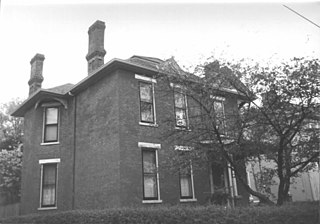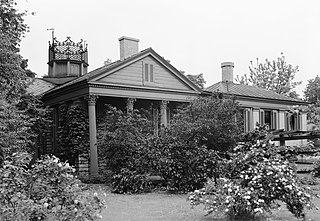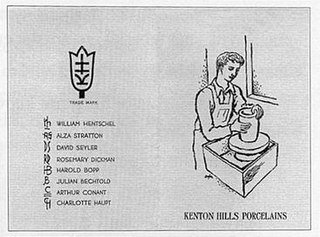
Seagrove is a town in Randolph County, North Carolina, United States. The population was 285 at the 2019 census. It was named after a railroad official when the area was connected by rail. The center of population of North Carolina is located a few miles east of Seagrove.

Greensboro is a borough in Greene County, Pennsylvania, United States. The population was 267 at the 2020 census, up from 260 at the 2010 census.

The Kolomoki Mounds is one of the largest and earliest Woodland period earthwork mound complexes in the Southeastern United States and is the largest in Georgia. Constructed from 350CE to 600CE, the mound complex is located in southwest Georgia, in present-day Early County near the Chattahoochee River.

Bomberger's Distillery, more recently Michter's Distillery, is a non-operating distillery facility that was, at the end of the twentieth century, believed to be the oldest remaining such building in the United States. The distillery closed in 1989. Although there are whiskey products currently on the market using the Bomberger's and Michter's brand names, they are more recently introduced products that have no direct connection to the old distillery.

Riverside, The Farnsley–Moremen Landing is a historic 300-acre (120 ha) farm and house in south end Louisville, Kentucky, along the banks of the Ohio River. The house, a red brick I-house with a two-story Greek Revival

The table below includes sites listed on the National Register of Historic Places (NRHP) in Jefferson County, Kentucky except those in the following neighborhoods/districts of Louisville: Anchorage, Downtown, The Highlands, Old Louisville, Portland and the West End. Links to tables of listings in these other areas are provided below.

Grinter Place is a house on the National Register of Historic Places above the Kansas River in the Muncie neighborhood of Kansas City, Kansas.

Grand Canyon Village Historic District comprises the historic center of Grand Canyon Village, on the South Rim of the Grand Canyon in Grand Canyon National Park, Arizona. The district includes numerous landmark park structures, many of which are National Historic Landmarks themselves, or are listed on the National Register of Historic Places. The town design as a whole is also significant for its attention to integration with the Grand Canyon landscape, its incorporation of National Park Service Rustic design elements, and for the idiosyncratic design of park concessioner structures such as the El Tovar Hotel.

This is a list of the National Register of Historic Places listings in Washington County, Kentucky.

This is a list of the National Register of Historic Places listings in Barren County, Kentucky.

This is a list of the National Register of Historic Places listings in Christian County, Kentucky.

Stone House by the Stone House Brook, also known as Old Stone House, is located at 219 South Orange Avenue in South Orange, Essex County, New Jersey, United States. It is one of the oldest extant structures in New Jersey, the original portion house built prior to 1680. The building was added to the National Register of Historic Places on November 22, 1991, for its significance in historic archaeology, education, community planning and development, and politics/government.

The Joseph Mitchell House is a historic residence in southern Monroe County, Indiana, United States. Located on Ketcham Road west of the community of Smithville, it is one of the oldest houses in Monroe County, and it has been designated a historic site.

Beech Grove Cemetery is a large historical cemetery and national historic district located at Muncie, Indiana. It was listed on the National Register of Historic Places in 1999.

Woodward Heights is a neighborhood and historic district located immediately west of downtown Lexington, Kentucky. It is bounded by Maxwell Street and the Pleasant Green Hill neighborhood to the southwest, by the parking lot for Rupp Arena to the southeast, by the Lexington Convention Center property to the northeast, and by Herlihy, Cox, and High Streets to the north.

Botherum was built for Madison C. Johnson in 1850 or 1851 by John McMurtry, a well-known architect and builder based in Lexington. The house was intended, in part, as a shrine to Johnson's late wife Sally Ann, a sister of Cassius Marcellus Clay who died giving birth in 1828.

The Startup Candy Company is the oldest candy company in Utah and one of the oldest candy companies in the United States. William Startup started making candy in his basement in Manchester, England in 1820. He developed the first hard candy and called it “American Cough Candy” because he hoped to bring his new recipe to America one day. However, William died before making it to America, but he left his legacy to his son and namesake. William Startup Jr. learned the candy-making process as a young boy and continued to run his father’s candy business.

Jugtown Pottery was founded in 1921 by Jacques and Juliana Busbee, artists from Raleigh, North Carolina, who in 1917 discovered an orange pie dish and traced it back to Moore County. There, they found a local tradition of utilitarian pottery in orange, earthenware, and salt glazes. The Busbees saw an opportunity to help save a dying craft, and in 1918 they set up the village store in Greenwich Village, New York, in order to sell the pottery. Potters they worked with over the years included J. H. Owen, Charlie Teague, and Ben Owen.

Kenton Hills Porcelains were high-fired soft paste porcelain products manufactured by Kenton Hills Porcelains, Inc. Ceramics were produced from 1940 to 1943 in Erlanger, Kentucky, with sales continuing to 1944. All ceramic products were made from native clays. Products include vases, bookends, figurines, lamp bases, and flowerpots.

James E. Pepper is an American whiskey brand. The brand is named after a historic American whiskey maker with that name who built and operated a distillery in Lexington, Kentucky, and marketed his whiskey under his family's brand name "Old Pepper" and under his own name. The brand's distillery, known as the Henry Clay distillery and later as the Old Pepper distillery and James E. Pepper distillery, was shut down in 1958 and was left abandoned for more than 50 years until Amir Peay purchased the historic distillery site and relaunched the brand name in 2008. Distilling resumed at the site in 2017.






















